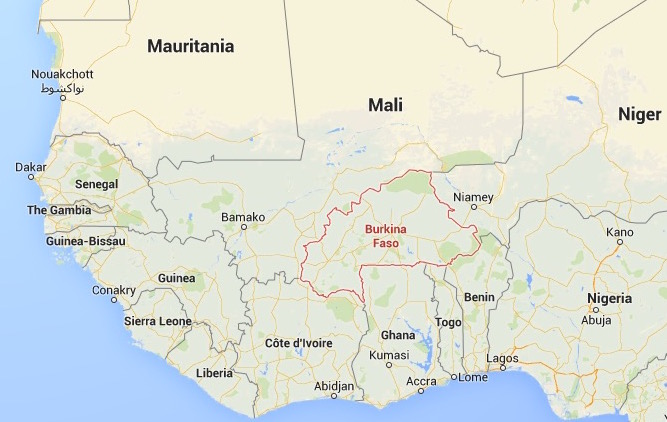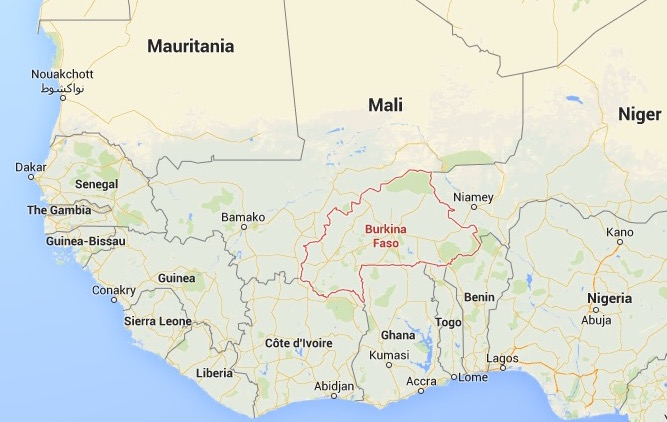Burkina Faso is burning, on the cusp of regime change


A free daily email with the biggest news stories of the day – and the best features from TheWeek.com
You are now subscribed
Your newsletter sign-up was successful
President Blaise Compaoré's 27 years in control of the West African nation Burkina Faso appear to be near an end, one way or another. On Thursday, hundreds of protesters stormed parliament in Ouagadougou, the capital, and set it ablaze, along with city hall, the ruling party headquarters, and homes of some of Compaoré's relatives and advisers. They also took over the state TV broadcaster. Security forces shot dead at least three protesters and wounded many others.

Late Thursday, armed forces chief Gen. Honoré Traoré announced the dissolution of parliament and said Burkina Faso will be governed by a transitional authority until new elections in about a year, though he didn't say who would lead the interim government. In a televised statement, Compaoré said he will lead the transitional government and had scrapped the constitutional amendment to extend his presidency that sparked the protests.
Comparoré took power in a coup in 1987, but has won four elections since. A 2000 constitutional amendment set a limit of two five-year terms, and parliament was set to vote on a proposal to allow Compaoré to stay on after his latest term ends next year. Now, "I am giving him 24 to 48 hours before he is forced to step down," a senior adviser to Ivory Coast's president, a longtime Compaoré ally, tells The New York Times. "I don't see how he can continue to hold power."
The Week
Escape your echo chamber. Get the facts behind the news, plus analysis from multiple perspectives.

Sign up for The Week's Free Newsletters
From our morning news briefing to a weekly Good News Newsletter, get the best of The Week delivered directly to your inbox.
From our morning news briefing to a weekly Good News Newsletter, get the best of The Week delivered directly to your inbox.
The former French colony, a gold and cotton exporter, is one of the poorest countries in Africa. This report from Reuters has more details about the ongoing uprising. --Peter Weber
A free daily email with the biggest news stories of the day – and the best features from TheWeek.com
Peter has worked as a news and culture writer and editor at The Week since the site's launch in 2008. He covers politics, world affairs, religion and cultural currents. His journalism career began as a copy editor at a financial newswire and has included editorial positions at The New York Times Magazine, Facts on File, and Oregon State University.
-
 The ‘ravenous’ demand for Cornish minerals
The ‘ravenous’ demand for Cornish mineralsUnder the Radar Growing need for critical minerals to power tech has intensified ‘appetite’ for lithium, which could be a ‘huge boon’ for local economy
-
 Why are election experts taking Trump’s midterm threats seriously?
Why are election experts taking Trump’s midterm threats seriously?IN THE SPOTLIGHT As the president muses about polling place deployments and a centralized electoral system aimed at one-party control, lawmakers are taking this administration at its word
-
 ‘Restaurateurs have become millionaires’
‘Restaurateurs have become millionaires’Instant Opinion Opinion, comment and editorials of the day
-
 Nobody seems surprised Wagner's Prigozhin died under suspicious circumstances
Nobody seems surprised Wagner's Prigozhin died under suspicious circumstancesSpeed Read
-
 Western mountain climbers allegedly left Pakistani porter to die on K2
Western mountain climbers allegedly left Pakistani porter to die on K2Speed Read
-
 'Circular saw blades' divide controversial Rio Grande buoys installed by Texas governor
'Circular saw blades' divide controversial Rio Grande buoys installed by Texas governorSpeed Read
-
 Los Angeles city workers stage 1-day walkout over labor conditions
Los Angeles city workers stage 1-day walkout over labor conditionsSpeed Read
-
 Mega Millions jackpot climbs to an estimated $1.55 billion
Mega Millions jackpot climbs to an estimated $1.55 billionSpeed Read
-
 Bangladesh dealing with worst dengue fever outbreak on record
Bangladesh dealing with worst dengue fever outbreak on recordSpeed Read
-
 Glacial outburst flooding in Juneau destroys homes
Glacial outburst flooding in Juneau destroys homesSpeed Read
-
 Scotland seeking 'monster hunters' to search for fabled Loch Ness creature
Scotland seeking 'monster hunters' to search for fabled Loch Ness creatureSpeed Read
